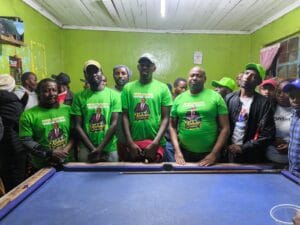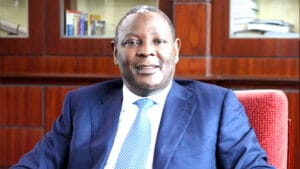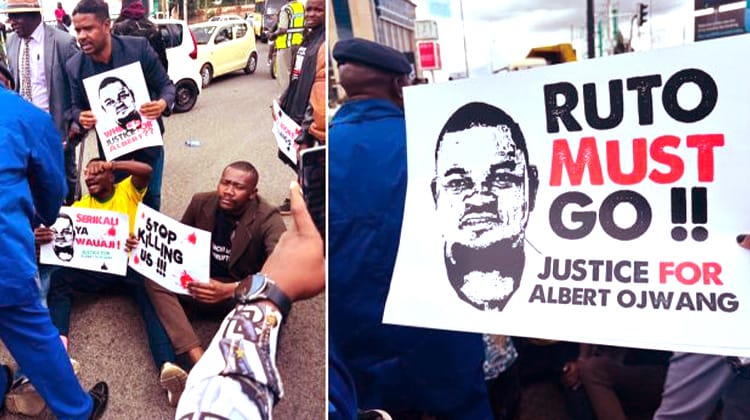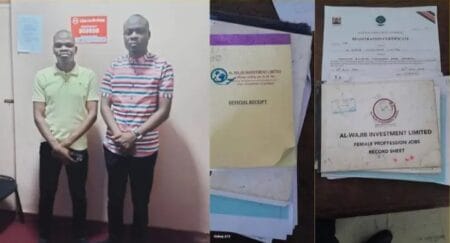On the morning of Monday, June 9, 2025, the usually busy stretch of Ngong Road in Nairobi witnessed scenes of unrest and outrage. Justice for Albert Ojwang Protests: Protesters gathered near the Nairobi Funeral Home—formerly City Mortuary—voicing their anger over the suspicious death of Albert Ojwang, a beloved social media influencer. The demonstrations were anything but ordinary. With smartphones held high, many demonstrators live-streamed the protest, ensuring the world watched as they demanded answers.
The chants were loud and pointed: “Ruto must go! Justice for Ojwang!” Activists accused the government of turning a blind eye to police brutality and demanded that President William Ruto and Deputy Inspector General Eliud Lagat resign. The roundabout near the mortuary became the heart of a growing movement, one demanding not just justice for Ojwang but also systemic reform in how detainees are treated in Kenya.
Traffic came to a halt, and anti-riot police were deployed to maintain control. But the crowd wasn’t violent—they were determined. Signs, banners, and cellphone footage captured the emotion and urgency that fuelled the march. And the question on everyone’s lips was simple: What happened to Albert Ojwang?
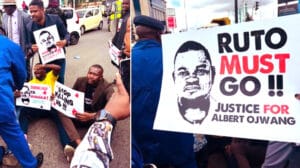
Albert Ojwang wasn’t just another name on the internet. At 31 years old, he had become a recognisable figure across Kenyan social media platforms, especially X (formerly Twitter). A proud resident of Homa Bay, Ojwang was known for his sharp commentary, humorous takes, and fearless critiques of powerful figures. That boldness, according to reports, might have been what led to his arrest.
On Saturday, June 6, officers from the Directorate of Criminal Investigations (DCI) arrived at Ojwang’s home and arrested him. The charge? Defaming Deputy Inspector General Eliud Lagat. That’s right—Ojwang’s social media post allegedly offended one of Kenya’s top police officials. From Homa Bay, he was swiftly transferred to Central Police Station in Nairobi, a move that raised eyebrows given the nature of the offence.
While in custody, Ojwang was placed in a holding cell. What happened next remains shrouded in mystery. On the evening of June 8, police say they found Ojwang unconscious in his cell. He was rushed to Mbagathi Hospital, where he was declared dead shortly after arrival. The police report claimed he sustained head injuries after banging his head against the wall—a claim the public and Ojwang’s family find hard to believe.
If the official story sounded questionable, the postmortem findings pushed public scepticism into full-blown outrage. When Ojwang’s family and their lawyer arrived at the Nairobi Funeral Home, they were met with chilling details.
Ojwang’s head was visibly swollen, his face marked with bruises, and there were injuries on his hands and shoulders. Blood had dried under his nose, and signs of trauma were evident. According to the family’s lawyer, these injuries were not consistent with self-inflicted wounds. They looked a lot more like defensive wounds—the kind you’d expect from someone trying to protect themselves during a beating.
The family rejected the police’s suicide explanation, citing the severity and location of the injuries. “If someone banged their head against the wall,” one relative asked, “why are their hands and shoulders bruised? Why is their nose bleeding?” These were not questions that could be dismissed.
The family’s concern deepened when it emerged that they were misled about the location of Ojwang’s body. Initially told it was in Homa Bay, but they later found it in Nairobi, suggesting an attempt to delay their access or possibly manipulate the autopsy process.
In a statement, Inspector General of Police Douglas Kanja reiterated that Ojwang was found unconscious during routine checks. He claimed the influencer hit his head against the wall, which led to fatal injuries. The narrative framed the death as a tragic but self-inflicted incident, not one caused by officer brutality.
However, that narrative quickly started to unravel.
The public questioned why an individual accused only of defamation—a non-violent, bailable offence—would be transferred across counties, held in a central police station, and end up dead within hours. And if he had injured himself, why was emergency medical care not provided immediately?
Adding to the controversy, IPOA (Independent Policing Oversight Authority) confirmed that their officers had been dispatched to investigate. They promised a full inquiry, but public confidence remained low. After years of custodial deaths and police abuse cases going unpunished, many Kenyans are sceptical.
Monday’s protest wasn’t just about Albert Ojwang. It was about a broken system—a police force that many believe acts with impunity, protected by political elites. The protesters demanded that the Central Police Station’s Officer Commanding Station (OCS) be suspended and investigated. They also called for DIG Eliud Lagat’s resignation, labelling him unfit to serve after his role in what they described as a “malicious arrest.”
Student leaders like Joshua Okayo, activists like Hanifa Adan, and civic voices like Fred Ogola gave speeches denouncing the government’s failure to act. They emphasised that this movement wasn’t just a mourning—it was a wake-up call. The youth are done waiting for change. They’re demanding it, loudly and clearly.
In the days ahead, activists have vowed to maintain pressure on both traditional media and social platforms, ensuring Ojwang’s name isn’t forgotten—and that no other Kenyan has to suffer the same fate.
